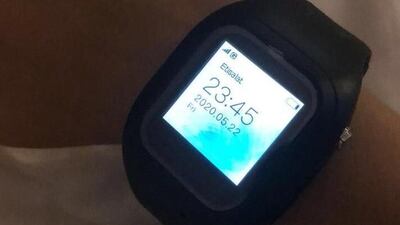Health authorities in the UAE are using smart wristbands to track and monitor patients as they self-quarantine at home.
These devices are only used for asymptomatic patients or those with milder symptoms, who do not require to be taken to hospital.
Patients between the ages of 18 and 59 who meet a set criteria can be allowed by medics to self-isolate in their homes.
The patient is expected to be aware of the importance of home isolation and ready to follow a treatment plan, if advised. An independent room with good ventilation and a separate toilet, and access to a smartphone are the other requirements.
“Tracing or monitoring bracelets are smart watches that serve as a tool to allow those who have been tested positive to self-isolate in the safety of their home and more importantly those who meet Department of Health and Abu Dhabi Public Health Centre Home Isolation Programme standards and regulations,” said a representative of the Department of Health Abu Dhabi.
“The programme applies to Covid-19 cases if the patient is asymptomatic or shows mild symptoms and has no risk factors. The patients will be given the home isolation instructions. An electronic monitoring watch will be tied to him or her for tele-monitoring purposes, along with the DoH Stay Home app.”
The patients cannot remove or tamper with these tracking wristbands, which should only be taken off by a medic once the patient has fully recovered.
Last month, Salem Al Zaabi, acting chief prosecutor of the Emergencies, Crisis and Disasters Committee in the federal public prosecution system, said those who defy the rules will face strict penalties.
"Anyone, who does not install or register in the Covid-19 tracing app on purpose and anyone who causes damage to the electronic bracelet or causes its malfunction, shall pay a Dh10,000 fine with the repair costs," he said.
Patients with severe symptoms and underlying health conditions are not allowed to isolate at home.
“High risk patients such as people above 60, people with chronic, cardiac or respiratory diseases, those who suffer from serious diseases that may affect their immunity system and others who require direct healthcare support are not eligible for the home-stay programme,” said the representative of the department.
Authorities have urged Emiratis and residents to download Al Hosn, an app that helps stop widespread infections by helping authorities track potential Covid-19 patients.
Al Hosn uses Bluetooth signals to detect if the carrier has come into contact with someone who may pose a risk of infection and has the app downloaded too.
"The monitoring watches are for those who have been tested positive and are in self-quarantine at home, whereas the Al Hosn app is available for the wider community," the representative said.
However, the app can be effective only if 50 to 70 per cent of the population uses it, said Dr Farida Al Hosani, spokeswoman for the health sector.
"We advise you to use it as this is the fastest tool to beat the virus," she said.
“It is available in three languages so that the majority of the population can use it.”
The free app can be downloaded on Android and iOS devices.














